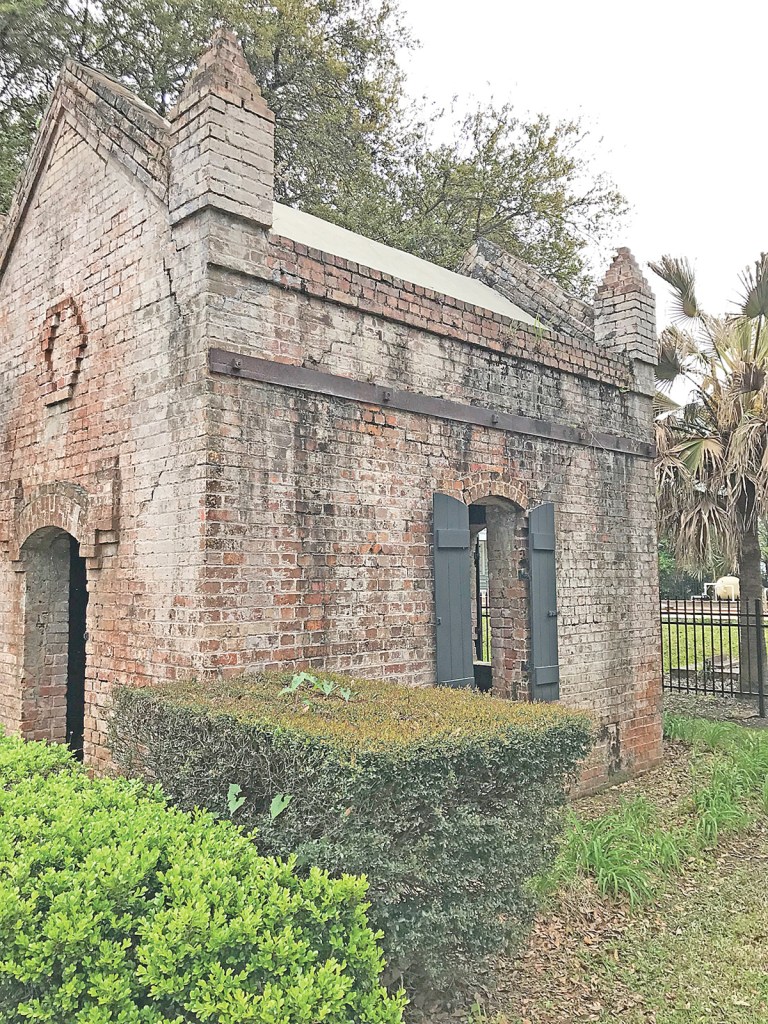An enduring legacy
Published 12:00 am Sunday, September 16, 2018

- This old building on the plantation grounds was used, possibly, as a smokehouse or to store wine.
When Simeon and Appoline Patout came to Louisiana from France, little could they have imagined that the sugar mill they founded in 1825 would become one of the longest-operating, family-owned businesses in the United States.
It was through the vision of Simeon and Appoline, and the pride and love of the industry, shared by future generations of family members, that M.A. Patout and Son LTD LLC, has become an integral part of an industry that creates thousands of jobs and contributes $3 billion to the Louisiana economy.
Trending
The family business, Enterprise Plantation, endured the ravages of the Civil War that ensued, along with storms, droughts, crop failures, a yellow fever epidemic and the devastation of the South after the war. Simeon died in 1848 and his wife Appoline took over running the company. In later years, her two sons, Hippolyte and Felix, ran the company. Upon the death of their mother, the family decided to sell the plantation at auction.
Felix and Hippolyte bought the plantation and following Hippolyte’s death, Felix sold his half interest in the plantation to Hippolyte’s widow, Mary Ann Schwing Patout. Together with her two sons, Hippolyte Jr. and Willie, she ran the plantation.
Ahead of her time, Mary Ann expanded the company and developed a railroad system to transport cane to the land-locked mill. In earlier days, 1,200-pound hogsheads of sugar had to be transported by mule-pulled wagons over dirty and muddy roads to Jeanerette’s Bayou Teche. A hogshead was a large cask or barrel that was used to ship and store materials or liquids such as tobacco, wine or sugar and was a standard of measurement dating back to Colonial days.
The trip to transport the sugar by wagon to Bayou Teche lasted 24 hours. Mary Ann also built a pipeline to Jeanerette to pump the juice to that site to complete refining there. Sugar and molasses were then shipped by barge on the Teche. In later years a rail spur to the Patout mill provided a less expensive access to shipping.
Mary Ann’s brother, John Schwing, was the founder of New Iberia National Bank. It was at this bank that she bought a block of stock. She was the first woman to sit on a Louisiana bank board, and was later named president of that bank.
As told by Randall Romero, chief executive officer of M.A. Patout and Son LTD LLC, this family-owned corporation, today owned by more than 130 members, has grown to include four companies. These companies are Enterprise Plantation in Patoutville, which manufactures raw sugar, along with Sterling Sugars in Franklin, and Raceland Raw Sugars in Raceland, Louisiana. Patout Equiptment Co. LLC in Patoutville is involved with harvesting and transportation services to independent sugar cane growers.
Trending
These three mills combine to have a processing capacity of 49,750 tons of cane a day. Among other products of sugar cane processing are blackstrap molasses which is used as a livestock feed supplement, and cane syrup.
Louisiana’s sugar industry takes great pride in the dedication of its farmers and employees. Working from dawn to dusk, seven days a week for approximately 100 days during the harvesting season, sugar cane farmers often have to sacrifice family holidays at Thanksgiving, Christmas, New Years, and other special events. Realizing that the job must be done, their commitment to the industry keeps them laboring through these holidays year after year. The wives and family members support the work of the farmers by maintaining records, running errands, attending to various responsibilities on the home front, and sometimes even in cooking and bringing meals to those working in the fields who cannot leave their jobs.
In 1751 sugarcane was brought to Louisiana by Jesuit priests, seventy-four years before Simeon, Hippolyte and Appoline Patout began milling their cane. In the 200-plus years since, the sugar industry has had a great impact on the economy of our state. In 1795, Etienne de Bore crystalized sugar from sugarcane and developed it into a successful crop valued at $12,000 on what is now Audubon Park in New Orleans. Presently grown on over 400,000 acres of land in twenty-two Louisiana parishes, the eleven raw sugar factories process approximately 13 million tons of cane a year, yielding approximately 1.4 million tons of sugar from Louisiana. On average, approximately 230 pounds of sugar are extracted per ton of cane. In the United States, sugar cane is produced in Florida, Louisiana, and Texas, with Florida and Louisiana producing the largest crops. Up until last year Hawaii was also a producer of sugarcane.
As profitable as the sugar cane crop is to our state economy, the industry is not without its challenges. Being a tropical plant, and with Louisiana lying on the northern limit for sugarcane cultivation, weather plays a significant role in the success of the crop. Droughts or hurricanes during the growing season, harvest seasons that are too wet and plant-killing freezes in December significantly impact the production and processing of the cane and its sugar content. Economic factors such as the price of sugar at market, the threat of increased sugar imports, and costs related to production, can adversely affect the profits realized. In addition, the growing costs of sugarc ane diseases can damage crops and research is on-going by the LSU AgCenter, the U.S. Department of Agriculture, and the American Sugar Cane League to breed new cane varieties which are resistant to disease to ensure a healthy plant.
Although Brazil produces approximately 25 percent of the world’s sugar, followed by India, China, Thailand and Pakistan, the people of the United States consume more sugar than any other country in the world. With concern growing over genetically modified food products, sugar derived from sugarcane is a natural product containing no GMO’s. At only 15 calories per teaspoon, sugar provides the energy our bodies need for immediate use, and it is also stored in reserves in our bodies for later use.
Throughout all the years of sugar production at M.A. Patout and Son LTD LLC, the company has met many challenges and survived and prospered to become today a major leader in the Louisiana sugar industry. That growth since the 1960s was driven by the vision, dedication and leadership of William S. Patout III until his retirement in 2001. Since that time and until his death in August 2017, Patout served as a consultant and a member of the company’s Board of Directors.
Under the leadership of William S. Patout III, the company acquired Sterling Sugars LLC and Raceland Raw Sugar LLC and was instrumental in installing the only cane diffuser in North America. This acquisition allowed the Enterprise factory to double its milling capacity.
Through the legacy of continued progress in the sugar cane industry, as exemplified by M.A. Patout and Son LTD LLC, its Board of Directors, employees, sugar cane producers and other industry members around the state, sugar will continue to be a major part of the Louisiana economy and celebrated for the sweetness it adds to our lives.





